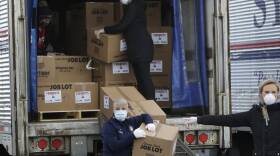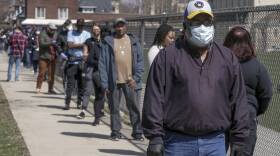EXPLORE MORE
Friday on BPR, live from the BPL:
'Press Play' with GBH's Callie Crossley & The Flipside's Yawu Miller
Live Music Friday: John Davidson
Media maven Sue O’Connell
Love Letters advice columnist Meredith Goldstein
Recent segments
-
Art Caplan: Rationing Guidelines Reflect Inequities Of Healthcare System, But Are 'What You've Got To Do'
Massachusetts' new guidelines for rationing medical resources prioritize young and otherwise healthy people. -
Chris Muther And Cat Mrs. Davenport Review Freeze-Dried Meals For Social Distancing
The travel writer gave highest marks to the freeze-dried beef stroganoff -
D’Amato Says Food Bank Supplies Are OK, Despite 50% Demand Increase
The Greater Boston Food Bank president said she’s mostly concerned with keeping workers safe from COVID-19. -
Carol Rose: The ACLU Is Calling For An Equitable Response To The Coronavirus Pandemic
Massachusetts should release racial data for COVID-19 response, says civil liberties union. -
John King Hopes Wisconsin Primary Opens Dialogue About Remote Voting
Voters are waiting in long lines to vote in the presidential primary on Tuesday, as the Governor's push to delay the election in the name of public health was denied. -
What Happens To Tom Brady If The NFL Season Is Canceled?
Will Brady ever get to step out onto field with his new team, if the 2020 NFL season is cancelled due to the coronavirus?
Listen to previous shows
-

Paul Reville: Schools Can't Open With Zero Risk Of COVID-19 Spread. So How Much Risk Are We Willing To Take To Send Our Kids To Class This Fall?
As some schools and colleges opt for in-person learning this fall, Paul Reville told Boston Public Radio on Thursday that even with concerns about COVID-19 spread in classrooms and dorms, society has to accept some level of risk in order to deliver its mandate to provide an education to people. “We’re not sure what’s going to happen, but we’ve got to be vigilant and we’ve got to be able to react quickly if things start to get out of hand,” he said. “It’s all a matter of risk tolerance. The notion that we’re going to get to zero risk is just totally unrealistic, none of us have zero risk in our day to day lives.” Reville is former Secretary of Education and a professor at Harvard University’s Graduate School of Education where he also runs the Education Redesign Lab. His latest book, co-authored with Elaine Weiss, is “Broader, Bolder, Better: How Schools and Communities Help Students Overcome the Disadvantages of Poverty.” -

Juliette Kayyem: How To Handle A Hurricane Amid A Pandemic
Homeland security expert Juliette Kayyem spoke with Boston Public Radio on Wednesday about Hurricane Laura, a Category 4 storm headed toward the Texas and Louisiana coasts. “You have to shelter differently because of COVID, so there’s a mandatory masking policy by all organizations who are running shelters,” she said. “It does not matter what a governor or local official says - no mask, no shelter, and I think that’s exactly right.” Kayyem is an analyst for CNN, former assistant secretary at the Department of Homeland Security and faculty chair of the homeland security program at Harvard University’s Kennedy School of Government. -

BPR Full Show 8/26/20: Defining Leadership
Today on Boston Public Radio: We opened lines to hear your impressions from night two of the Republican National Convention. Former Trump Campaign Manager Corey Lewandowski gave his take on nights one and two of the RNC, and defended his stance that President Trump deserves four more years in office. CNN analyst and national security expert Juliette Kayyem discussed the heightened challenges of navigating Hurricane Laura and other storms during the coronavirus pandemic, and the worrying rise in political influence from proponents of the QAnon conspiracy theory. MIT economist and Affordable Care Act architect Jonathan Gruber discussed why public services function better outside of the private sector, and weighed in on the economic and political factors that are creating issues at the U.S.P.S Nancy Koehn talked about the key components of crisis leadership, and reflected on how national and global leaders have handled the COVID-19 crisis. Koehn is a Harvard Business School historian and author of “Forged in Crisis: The Power of Courageous Leadership in Turbulent Times.” Medical ethicist Art Caplan discussed problems with President Trump's Right to Try Act, which was touted at Tuesday night’s RNC, and talked about new research indicating around half of K-12 teachers in the US have definite or possible risk factors for contracting serious cases of COVID-19. -

BPR Full Show 8/25/20: Your Questions on Vote By Mail, Answered
Today on Boston Public Radio: We opened our lines to hear your take on night one of the Republican National Convention. NBC Sports Boston reporter and anchor Trenni Kusnierek discussed institutional racism in New England's collegiate sports, 77 false positive COVID-19 tests in the NFL, and a recent statement from NFL commissioner Roger Goodell, who said he should have “listened earlier” to Colin Kaepernick. Mass. State Senator Becca Rausch talked about the successes and setbacks of mail-in voting in Mass., and responded to questions and comments from listeners. Ali Noorani, Executive Director for the National Immigration Forum, discussed unfair assumptions about foreign-born voters in the U.S., and concerns about the looming furlough of 70% of employees at the U.S Citizenship and Immigration Services. Former New Hampshire GOP chair and Lincoln Party co-founder Jennifer Horn talked about her impressions from night one of the RNC, and her PAC’s latest anti-Trump ad, titled “Evil.” CNN Chief National Correspondent John King reflected on night one of the RNC, and news of White House counselor Kellyanne Conway’s exit from the Trump administration at the end of August. We opened our lines to talk with listeners about your experiences dealing with Monday's widespread Zoom outages. -

Ali Noorani: How Naturalized Citizens Can Affect Elections
Ali Noorani spoke with Boston Public Radio on Tuesday about the impact of naturalized immigrants on voting in 2020. “It’s in really important parts of the country where you see the share of eligible voters who are foreign-born really skyrocket,” he said. “48 percent of eligible voters in Miami-Dade, Florida are foreign-born, and 22 percent of eligible voters in Fort Bend, Texas are foreign-born; So Georgia, Texas, and South Florida are communities that are going to see a disproportionate impact of foreign-born voters this November.” Ali Noorani is Executive Director of the National Immigration Forum, his latest book is There Goes the Neighborhood: How Communities Overcome Prejudice and Meet the Challenge of American Immigration.









